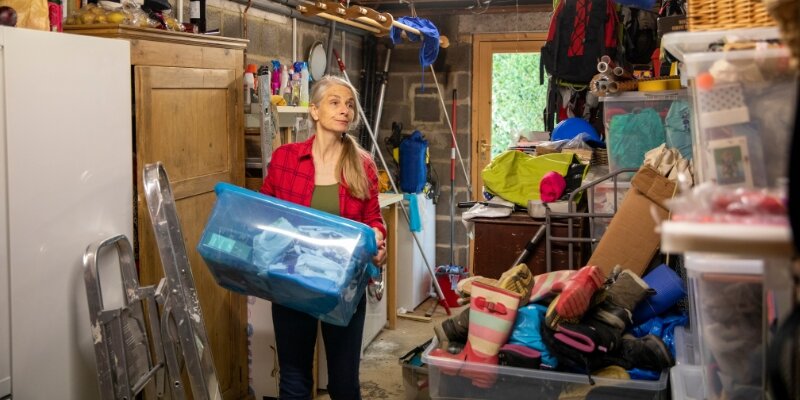
Losing a parent is a deeply emotional and challenging experience. Amidst the grief, there’s often the daunting task of cleaning out their home. This process can be overwhelming, both emotionally and practically.
In this comprehensive guide, we’ll walk you through the steps of how to clean out your parents’ house after their death. Whether you’re dealing with a small house or apartment or a sprawling estate, this guide will help you navigate the process efficiently and with sensitivity.
In Today’s Article:
- 1. Preparing Emotionally
- 2. Assembling a Support Team
- 3. Sorting and Organizing
- 4. Estate Sale or Auction
- 5. Cleaning and Repairs
- 6. Legal and Financial Matters
- 7. Finalizing the Property
1. Preparing Emotionally
Before you start the process of cleaning out your loved one’s belongings, take time to prepare emotionally. This can be a difficult, emotionally taxing and sentimental journey. Allow yourself to grieve and seek support from friends, a family member, or a therapist if needed. It’s crucial to be in the right frame of mind to make clear decisions.
2. Assembling a Support Team
Cleaning out a house is a significant task that’s often too much to handle alone. Enlist the help of family members, close friends, or professionals like estate cleanout services.
Having a support team can provide emotional support and make the process more manageable that way you don’t feel overwhelmed.
Other Articles You Might Enjoy:
- How to Sell a Probate House in Texas in 2025
- How to Price Your Inherited Home in Houston: A Complete Guide
- Did You Inherit a House with a Mortgage? Learn Your Options
- Inheriting A Property in Texas: Laws, Probate & Options
- 5 Essential Steps to Sell Your Inherited Manufactured Home in Texas
3. Sorting and Organizing

Start by categorizing items into three main groups: keep, sell/donate, and dispose. Be methodical, and consider creating an inventory or list of items and personal property, which can be helpful for legal purposes and in determining the estate’s value.
A. Begin Room by Room: To maintain order and prevent feeling overwhelmed, start the sorting with a few items and process room by room. This helps you focus on the specific room or areas and prevents smaller groups of items from getting mixed up.
B. The “Keep” Category:
- Essential Items: Identify and set aside items that you or family members may want to keep. These could include family heirlooms, sentimental items, important documents, and personal belongings.
- Items of Value: Separate high value items that you plan to keep or sell separately. For example, jewelry, antique furniture, or collectibles may fall into this category.
- Future Use: Consider if any items might be useful in the future. For instance, kitchenware, tools, or furniture that can be repurposed by family members or kept for sentimental reasons.
C. The “Sell/Donate” Category:
- High-Value Items: Identify items with significant resale value. These might include vintage clothing, rare books, or antique furniture. Research their market value and consider professional appraisals if needed.
- Donations: Donate items in good condition that don’t hold significant monetary value. Consider local charities, shelters, or nonprofit organizations that accept donations. This is a meaningful way to give back.
- Charitable Auctions: Some items can be donated to charity auctions, which can generate funds for a good cause while honoring your parents’ memory.
D. The “Dispose” Category:
- Non-Recyclable and Non-Donatable: Items that are broken, damaged, or no longer usable should be disposed of properly. Hire a waste removal service to handle large items and hazardous materials.
- Recycling: Whenever possible, recycle items like paper, cardboard, glass, and plastics. This reduces waste and is an environmentally responsible choice.
- Electronics and Hazardous Materials: Be cautious with the disposal of electronics and hazardous materials like old paint or chemicals. Research local guidelines for proper disposal methods.
E. Creating an Inventory:
- Detailed Lists: As you sort through items, create detailed lists or spreadsheets. Include descriptions, condition, and estimated value. This inventory can be invaluable for legal purposes, such as estate settlement and taxes.
- Photographs: Take photographs of valuable or sentimental items. These visuals can serve as documentation and help with identification if needed.
- Digital Tools: Consider using digital inventory tools or apps designed for estate cleanouts. These tools can streamline the process and make it easier to keep track of items.
Remember that while sorting and organizing, it’s essential to involve family members in the decision-making process. Items can hold different sentimental values for each person, and open communication can help prevent conflicts and ensure everyone’s wishes are respected.
By taking a systematic and organized approach to sorting and organizing unwanted items from your loved one’s home, you’ll not only make the estate cleanout more manageable but also facilitate the transition of your parents’ belongings with care and thoughtfulness.
4. Estate Sale or Auction

Consider holding an estate sale or auction to sell items of value. This can help offset costs from the home cleanout process.
A. Assessing Items for Sale:
- Valuable Items: Determine which items have significant monetary value. This includes antiques, collectibles, fine art, jewelry, high-end furniture, and rare items. Consult with appraisers to get an accurate valuation if necessary.
- Collectible Collections: If your parents had collections, such as coins, stamps, or vintage toys, consider selling them separately or as a collection to collectors who specialize in those areas.
- Furniture and Appliances: Evaluate the condition of furniture and appliances. Items in good condition can be attractive to buyers, especially if they’re vintage or high-quality.
B. Hiring Professionals:
- Estate Companies: Consider hiring this type of company or professional estate liquidators. They have experience in organizing and conducting successful sales, including pricing items appropriately.
- Appraisers: Work with certified appraisers to determine the fair market value of items that may hold value. Their expertise ensures you get the best price for these items.
- Advertising and Promotion: These professionals typically handle advertising and promotion. They can create ads, manage the sale logistics, and attract potential buyers through various channels, including online listings, social media, and local newspapers.
C. Pricing and Preparing for the Sale:
- Pricing Strategy: Collaborate with estate professionals to develop a pricing strategy. Pricing can vary depending on factors like market demand, item condition, and rarity.
- Tagging and Labeling: Ensure that each item for sale is clearly tagged and labeled with its price. Organize items neatly to make it easy for shoppers to browse.
- Security Measures: Implement security measures to safeguard valuable items during the sale. This may include hiring security personnel or using surveillance cameras.
D. Sale Logistics:
- Date and Duration: Determine the dates and duration of the sale. Typically, estate sales run for a weekend or a few days to attract a broader range of buyers.
- Payment Methods: Decide on the payment methods accepted during the sale. Cash is commonly used, but also consider accepting credit cards or mobile payment options for convenience.
- Signage: Place clear signage to direct potential buyers to the sale location. Use large, visible signs at nearby intersections to attract more foot traffic.
E. Handling the Sale:
- Staffing: Ensure you have enough staff or volunteers to manage the sale efficiently. Staff can help answer questions, provide assistance, and handle transactions.
- Negotiation: Be prepared for buyers to negotiate prices, especially on the second or third day of the sale. Estate professionals can guide you on setting negotiation boundaries.
F. Post-Sale Activities:
- Remaining Items: After the estate cleanout sale, evaluate what items remain. You can choose to donate or dispose of any unsold items.
- Clean-Up: Arrange for a clean-up crew to remove any remaining items and ensure the property is left in a clean and orderly condition.
- Proceeds Distribution: Determine how the proceeds from the sale will be distributed, whether among family or according to your parents’ wishes as outlined in their will.
Holding an sale or auction can be an effective way to liquidate items of value and offset expenses associated with cleaning out your loved one’s personal belongings.
By working with professionals and following a well-structured plan, you can maximize the value of the items sold and simplify the process.
5. Cleaning and Repairs

Once your loved one’s house is empty, it’s time for thorough cleaning and any necessary repairs. This is essential if you plan to sell your loved one’s home. Consider hiring professional cleaners and contractors for major repairs.
A. Cleaning the Property:
- Deep Cleaning: After all belongings are removed, schedule a deep cleaning of the entire house. This includes scrubbing floors, cleaning windows, and sanitizing bathrooms and kitchens.
- Carpets and Upholstery: Consider professional carpet and upholstery cleaning to freshen up the space. This can be especially beneficial if the house has been vacant for a while.
- Odor Removal: Address any lingering odors, such as those from pets, smoking, or mustiness. Professional odor removal services can help make the house more appealing to potential buyers.
B. Repairs and Maintenance:
- Assessment: Conduct a thorough inspection of the property to identify necessary repairs. Focus on structural issues, plumbing, electrical systems, and any safety hazards.
- Major Repairs: If significant repairs are needed, such as a leaky roof, a faulty HVAC system, or plumbing problems, consider hiring licensed contractors to address these issues promptly.
- Cosmetic Repairs: Attend to cosmetic repairs like repainting walls, fixing minor drywall damage, and replacing broken fixtures. These small touches can greatly improve the property’s appearance.
C. Staging for Sale:
- Home Staging: Consider professional home staging services to make the house more appealing to potential buyers. Staged homes often sell faster and at higher prices.
- Decluttering: Ensure the property is decluttered and depersonalized to allow buyers to envision themselves living there.
D. Selling for Cash:
- Fast Cash Sales: In some cases, you may want to sell the property quickly for cash. Companies specializing in cash home buying can provide an expedited sale process, often within days, which can be particularly useful if you need to settle your loved one’s estate promptly or avoid the hassle of traditional real estate transactions.
- Benefits of Cash Sales: Cash sales eliminate the need for repairs, renovations, and real estate agent commissions. They also provide a straightforward, hassle-free process, making it a convenient option for many sellers when selling a loved one’s house.
- Contact Our Company: If you’re interested in exploring the option of selling your parents’ house for cash, consider reaching out to our company. We specialize in cash home purchases and can provide a fair, no-obligation offer. Contact us at (281) 595-7550 to learn more about this streamlined selling process.

Why Sell Your House To TX Cash Home Buyers?
1. You Pay Zero Fees
2. Close Quickly or the date of your choice
3. Guaranteed Offer
4. No repairs required, we buy as is
5. Less Hassles!
Call Now (281) 595-7550 Send Text
E. Final Inspections and Maintenance:
- Final Check: Before putting the property on the market, conduct a final inspection to ensure all repairs and cleaning have been completed to your satisfaction.
- Regular Maintenance: If the house remains vacant during the selling process, arrange for regular maintenance to keep the property in good condition. This includes lawn care, snow removal, and checking for signs of pests or damage.
Cleaning, repairs, and preparing the house for sale are crucial steps in the process of settling an estate. Whether you choose clean out a house after a loved one’s death to sell for cash or go through traditional channels, a well-maintained and clean property can significantly increase its appeal and value in the real estate market.
6. Legal and Financial Matters
- Legal Assistance: At this stage, it’s crucial to consult with an attorney who specializes in estate law. They can guide you through the legal aspects, such as probate, will execution, and any necessary court filings.
- Financial Accounts: Identify and close or transfer your parents’ financial accounts. This includes bank accounts, investments, and retirement funds. Notify financial institutions of their passing.
- Outstanding Debts: Address any outstanding debts or loans. Ensure that bills, mortgages, and credit cards are settled appropriately. Consult with creditors if needed.
- Tax Considerations: Be aware of potential tax obligations related to the estate, including estate taxes and income taxes. Your attorney or a tax professional can provide guidance on managing these.
- Executor Responsibilities: If you are the executor of the estate, understand your legal responsibilities and obligations. This includes distributing assets according to the will and ensuring all legal requirements are met.
7. Finalizing the Property
- Property Transfer: If you plan to sell the property, work with your attorney to ensure a smooth transfer of ownership. This may involve filing paperwork with the local government.
- Notify Relevant Parties: Inform utility companies, insurance providers, and any other relevant parties about the change in ownership or the intention to sell the property.
- Closing Accounts: Close any remaining accounts associated with the property, such as utility accounts or homeowner’s insurance.
Conclusion
Cleaning out your parents’ house after their passing is a challenging endeavor, but with careful planning, emotional support, and a methodical approach, it can be managed. Remember to take your time, make informed decisions, and seek professional help when needed. By following this comprehensive step by step guide, you can navigate the process to clean out a house with sensitivity and efficiency.
If you need assistance with any aspect of this grieving process, feel free to reach out to our team. We’re here to support you during this difficult time. To get started, simply fill out the contact form on our website or give us a call at (281) 595-7550.
Navigating the process of cleaning out your parents’ house after their death can be overwhelming, but with the right guidance and support system, you and entire family can ensure that their belongings are handled with care, and the property is managed according to their wishes. Remember, you’re not alone in this estate cleanout journey, and there are resources available to help you every step of the way.
Frequently Asked Questions

Q: Who is responsible for cleaning the house after a death?
A: The responsibility for cleaning up after a death often falls on the deceased person’s family or the executor of their estate. This includes sorting and organizing belongings, cleaning the property, and managing repairs if necessary.
Q: Are family members responsible for deceased bills?
A: Generally, family is not personally responsible for the deceased person’s bills. However, the deceased person’s estate is typically responsible for settling outstanding debts. The executor or administrator of the estate is responsible for identifying and paying these debts using the assets from the estate.
Q: What debts are forgiven upon death?
A: Not all debts are forgiven upon the death of an individual. The debts that are typically forgiven include:
- Unsecured debts: These include credit card debt, personal loans, and medical bills. In most cases, these debts do not pass to the surviving family.
- Federal student loans: Federal student loans are generally discharged upon the death of the borrower.
Debts that are typically not forgiven include:
- Secured debts: These are debts tied to specific assets, such as a mortgage or auto loan. If the deceased person had secured debts, the lender may seek repayment by selling the collateral (e.g., the house or car) or transferring the debt to a co-signer.
- Taxes: Any owed taxes, including income tax, may need to be paid from the deceased person’s estate.
- Child support and alimony: Obligations for child support and alimony generally continue after the death of the responsible party.
Q: Who notifies Social Security when a person dies?
A: When a person passes away, it’s typically the responsibility of the family to notify the Social Security Administration (SSA) of the death. You can do this by contacting your local SSA office or by calling the SSA’s toll-free number. Be prepared to provide the deceased person’s Social Security number, date of birth, and date of death. This notification is important to prevent any improper benefit payments and to ensure that survivors are eligible for any applicable survivor benefits.
Disclaimer:
The content provided on this blog is for informational purposes only. We are not attorneys or tax professionals. For personalized legal or tax advice, please consult with a qualified professional.
Written by Lisa Martinez, Founder of TX Cash Home Buyers

About The Company
TX Cash Home Buyers helps Texas homeowners sell quickly and simply — even in tough situations like repairs, inherited homes, or financial stress. Founded by Lisa Martinez, we’re known for our local experience, fair offers, and commitment to guiding sellers through off-market sales with clarity and care.




